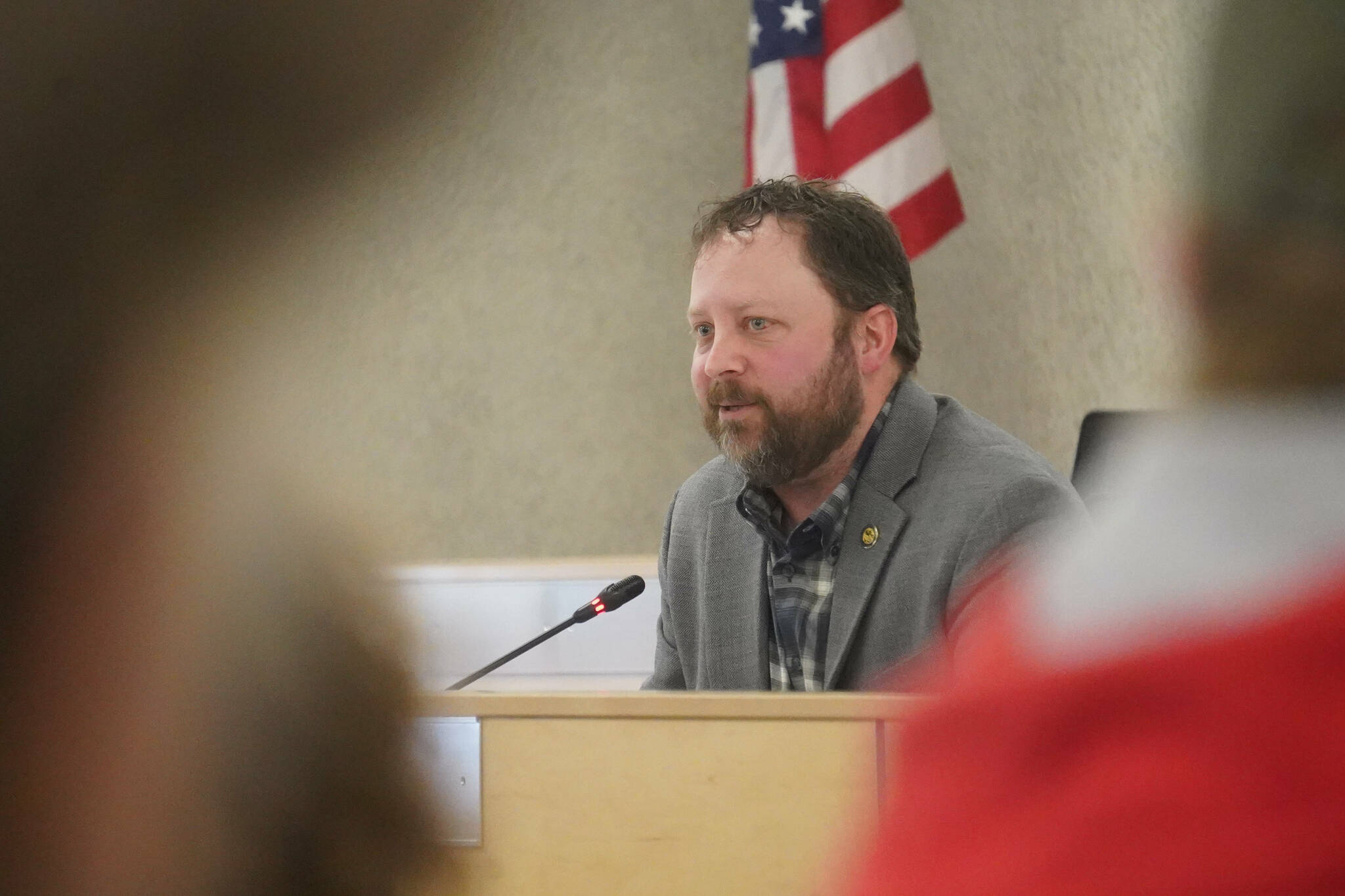Well over 100 people packed into the Betty J. Glick Assembly Chambers in Soldotna on Saturday for a town hall meeting with three of the Kenai Peninsula’s state legislators. Sen. Jesse Bjorkman, R-Nikiski; Rep. Justin Ruffridge, R-Soldotna; and Rep. Bill Elam, R-Nikiski, all attended a meeting that extended over three hours.
During the town hall, 46 people offered testimony on a variety of topics including the state’s budget, education funding, fishing policy, road maintenance, defined benefits, election integrity and electronic gambling.
“It’s very important for us as your representatives in the Legislature to hear from community members about things that are important and hear about what issues we face,” Bjorkman said.
On education, Bjorkman said Alaska’s educational systems cannot improve without the state putting forward resources capable of delivering outcomes. That said, he supports developing “clear and achievable” expectations that can be implemented in Alaska education to help students be more successful.
Elam said that he’s trying to find balance amid tough conversations about state finances, grappling with a projected deficit while people call for increases in funding.
“Stabilizing our revenues to our spending is going to be a big issue,” he said. “When we start making commitments for forever dollars in any program, where are those forever revenues going to be coming from?”
The question of school funding is important, Ruffridge said. It’s “very fluid and very ongoing,” unlikely to be resolved until the end of the session. He said he wants to see reforms to the way the state tracks school performance — seeking growth in students more than comparing children as proficient or not. He also repeated his desire to see expansions for charter and correspondence schools.
Many people spoke in support of House Bill 69, which would add a $1,000 increase in per-student funding from the state.
They included Will Hubler, a long-time employee of the Kenai Peninsula Borough School District and a former student of that district who’s seen local schools stretch their resources “farther and farther, getting just thinner and thinner.” Laura Gravelle said that in seven years working as a paraprofessional in the district, she’s seen few classrooms with the staffing they need. Tyson Cox, a member of the Kenai Peninsula Borough Assembly who sponsored a resolution calling on the Legislature for increased school funding, said the issue facing local schools is the uncertainty of not knowing what funding will come from the state until months after they have to create their budgets.
“Our families are saying ‘why can’t education look like how it did when I was in school?’” K-Beach Elementary Principal Janae Van Slyke said. “We’re not funding it the same way. We’re putting a lot of money into education, yes, but things cost a whole lot more. I don’t know if you’ve been to the grocery store lately, but it’s costing me a whole lot more. So do our kids, and they’re important.”
Some said they don’t support increased funding through the BSA. Marnie Olcott said “the issue that needs to be addressed” is the number of Kenai Peninsula students who are homeschooled. Ed Oberts said he wanted to see the Alaska Permanent Fund dividend supported, and that people could choose to use that money to support the causes they care about like roads or schools.
Many others said they worried about the loss to the district of other funding as the administration of U.S. President Donald Trump works to dismantle the federal Department of Education. Specifically, several people said they feared the loss of the district’s students in transition program that serves students facing housing insecurity.
Kelly King, who has helmed that program for many years, said it’s important to allow vulnerable students to access education. It’s not funded at the national level for next year yet, she said, meaning the federal funding students in transition relies on “may not exist after June 30.”
“Our public school system is going to need a dependable education allotment more than ever,” she said. “Our students will still have those needs.”
The state’s budget will be a hot topic in the coming months.
It’ll be challenging, Elam said, to reach a place where everyone can agree on the budget. The state’s largest revenue source is the federal government, followed by the permanent fund dividend.
“We are not in a particularly good spot,” he said. “I want to make sure that we’re producing services and being able to deliver quality product, but we have to do so in a fiduciarily responsible way.”
Ruffridge said as the Legislature explores revenues and expenses, he wants to see them “go line by line and tell people what we’re going to cut.”
“We have to execute our constitutional mandate,” Bjorkman said. “That’s what I advocate for. It’s schools. It’s roads. It’s public safety. It’s managing our natural resources so that we can grow our economy.”
For more information about the three legislators, visit “Senator Jesse Bjorkman,” “Representative Justin Ruffridge” and “Rep. Bill Elam” on Facebook.
Reach reporter Jake Dye at jacob.dye@peninsulaclarion.com.


